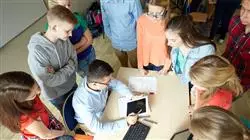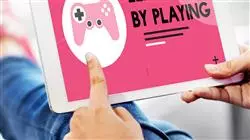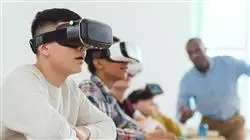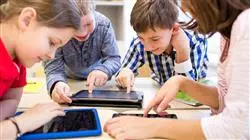
University certificate
The world's largest faculty of education”
Description
The most effective and advanced curricular materials, in a highly qualified specific program"

Psychopedagogy has reached, by its own merits, a place of recognition in the current scientific panorama. The knowledge of this discipline has become the subject of Articles, Monographs, and Publications at International level that have shaped a Panorama of great interest for the Professional. These developments have led to advances in Techniques, Disciplines, and Modes of Presence and Intervention that make constant updating an Indispensable Condition.
This increasingly broad program leaves the educational center in order to reach all types of sectors, specifically the socio-labor field, where it becomes an invaluable asset. The new social and labor circumstances, the new educational challenges, the vertiginous evolution of cultural contexts and many other challenges, require the greatest capacity in the professionals of Psychopedagogy.
In terms of intervention, mediation with families has also become increasingly important. The incursion of new technologies in social, school, or family life, sexual or functional diversity, or any of the new paradigms are not static, but evolve and constantly require a competent look that supports, guides, and serves as a reference and, in turn, has adequate professional support.
A thorough overview of intense challenges that, in this comprehensive program, TECH tries to help students face. With the most complete human and technological resources that will allow us to move forward in a safe, comfortable and efficient manner.
A comprehensive program, that will provide you with all the necessary knowledge to access this important area of work”
This postgraduate certificate in Curricular Materials and Educational Technology contains the most complete and up-to-date program on the market. Its most notable features are:
- Practical cases presented by Psychopedagogy Experts
- Designed with graphic, schematic, and eminently practical content
- Latest advancements on School Psychopedagogy
- Practical exercises where the self-evaluation process can be carried out to improve learning
- Algorithm-based interactive learning system for decision-making in the situations that are presented to the student
- Evidence-based Methodologies in School Psychopedagogy
- Theoretical lessons, questions to the expert, debate forums on controversial topics, and individual reflection assignments
- Content that is accessible from any fixed or portable device with an Internet connection
Acquire new practical tools for Psychopedagogy applied to learning, in only six weeks"
The teaching staff of this postgraduate certificate in Curricular Materials and Educational Technology is made up of professionals in the sector, who pour all their knowledge and experience into this program to produce quality content, in addition to recognized specialists belonging to leading societies and prestigious universities.
The Multimedia Content has been elaborated with the latest Educational Technology, which will allow the Professional a situated and contextual learning, through which the student will be able to study in a simulated environment in which they will be able to learn in real situations.
The design of this program is based on Problem-Based Learning, so that the professional will have to try to solve the different situations of Professional Practice that arise throughout the training. For this reason, students will be assisted by an innovative, interactive video system created by renowned and experienced experts in the field of School Psychopedagogy with extensive teaching experience.
Add the qualification your résumé needs in an increasingly demanding labor market"

With the best facilities so you can combine your studies with your personal or professional life, without any problems and with total independence"
Objectives
The main objective of this program is to offer a high-quality complement to students’ skill sets. Through the development of a very complete program, TECH will accompany you in the acquisition of the necessary skills and competencies to be able to deal with the challenges that Psychopedagogy faces in the exercise of its task. But it will also promote personal growth through a curriculum created to encourage intellectual development.

A comprehensive program that will allow you to incorporate your knowledge to your professional work immediately"
General Objectives
- Acquire new competencies and skills in the field of Psychopedagogy
- Get up to date in the field of Psychopedagogy in the school context
- Develop the capacity to face new situations in the school context
- Encourage interest in the constant updating of professionals
- Know the different intervention options
- Learn new ways of dealing with Special Educational Needs
- Achieve an efficient framework for Evaluation, Diagnosis, and Guidance
- Be able to research and innovate in order to respond to new demands
Specific Objectives
- Learn about the New Role of the 2.0 Counselor
- Study the Possibilities of the Internet as a Support for the Educational Field
- Learn ICTs in the Environment of Attention to Diversity

Achievable, measurable and highly applicable objectives: so that your efforts give you the results you need"
Postgraduate Certificate in Curricular Materials and Educational Technology
Nowadays, it is essential to be updated in terms of curricular materials and educational technology to be able to perform successfully in the educational field. TECH's Postgraduate Certificate in Curricular Materials and Educational Technology is a 100% online degree that will allow you to learn about the latest trends in the field of education and technologies applied to learning. By taking this program, you will acquire knowledge about the new role of the 2.0 counselor and the possibilities offered by the Internet to support the educational field. You will also learn about ICT in the environment of attention to diversity and the curricular materials necessary for new teaching-learning methodologies and educational innovation. In addition, this program will allow you to develop skills in the use of technological tools and apply them effectively in the educational field. You will learn how to use different resources and digital platforms for the design and creation of curricular materials and how to integrate ICT in the classroom to improve student learning.
Expand your skills and knowledge with this 100% online degree
Studying TECH's Postgraduate Certificate in Curricular Materials and Educational Technology will open up a wide range of job opportunities in the field of education, as you will be able to work in the creation of teaching materials and the integration of ICT in the classroom, both in schools and training centers. In addition, you will be able to specialize in areas such as attention to diversity and educational innovation, which will allow you to stand out in an increasingly competitive labor market. During your study you will learn about the new role of the 2.0 counselor through specific educational materials developed by the most knowledgeable teachers who will even accompany you throughout the process, to clarify any doubts that may arise. Take advantage of this unique opportunity for professional expansion and enroll now.






